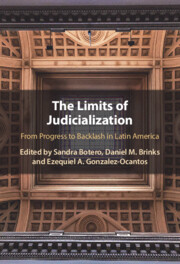Book contents
- The Limits of Judicialization
- The Limits of Judicialization
- Copyright page
- Contents
- Figures
- Tables
- Contributors
- Acknowledgments
- 1 Working in New Political Spaces
- 2 Critical Disconnects
- 3 When Winning in the Courts Is Not Enough
- 4 Forms of Countermovement and Counter-Reform in Latin America
- 5 Backlash against State Strengthening Reforms
- 6 Backlash against Corporate Accountability for Grave Human Rights Violations in Colombia
- 7 Courting Judicial Legitimacy
- 8 Family Ties and Nepotism in the Mexican Federal Judiciary
- 9 Judicial Corruption
- 10 Kickbacks, Crackdown, and Backlash
- 11 Turning Corruption Trials into Political Tools in the Name of Transparency
- 12 Fighting Corruption, Dismantling Democracy
- 13 Prosecutorial Agency, Backlash and Resistance in the Peruvian Chapter of Lava Jato
- Index
- References
7 - Courting Judicial Legitimacy
An Experimental Study of the Colombian Constitutional Court
Published online by Cambridge University Press: 11 August 2022
- The Limits of Judicialization
- The Limits of Judicialization
- Copyright page
- Contents
- Figures
- Tables
- Contributors
- Acknowledgments
- 1 Working in New Political Spaces
- 2 Critical Disconnects
- 3 When Winning in the Courts Is Not Enough
- 4 Forms of Countermovement and Counter-Reform in Latin America
- 5 Backlash against State Strengthening Reforms
- 6 Backlash against Corporate Accountability for Grave Human Rights Violations in Colombia
- 7 Courting Judicial Legitimacy
- 8 Family Ties and Nepotism in the Mexican Federal Judiciary
- 9 Judicial Corruption
- 10 Kickbacks, Crackdown, and Backlash
- 11 Turning Corruption Trials into Political Tools in the Name of Transparency
- 12 Fighting Corruption, Dismantling Democracy
- 13 Prosecutorial Agency, Backlash and Resistance in the Peruvian Chapter of Lava Jato
- Index
- References
Summary
Since its creation in 1991, the Constitutional Court has played an important role in the Colombian context because of the broad political, economic, cultural, and social impact of its decisions. Several rulings, however, have triggered fierce criticism, putting into question the very legitimacy of the court. This chapter seeks to identify some of the factors that contribute to improve the legitimacy of high courts in the eyes of the country’s citizens, especially when they hand down controversial rulings. The chapter reports a vignette survey experiment on college students aimed at determining under what conditions citizens are more likely to provide diffuse support to the court or to what extent the court’s legitimacy depends on its performance (specific support). It hypothesizes that the legitimacy of the court is affected by the way in which its decisions are framed and justified, and finds that by wording and framing judicial rulings so that they convey a sense of principled reasoning and neutrality, the court helps translate specific support into diffuse support. Specifically, decisions based on scientific reasoning are more suitable to achieve that goal than other types of argument, including those based on legal norms and precedent.
- Type
- Chapter
- Information
- The Limits of JudicializationFrom Progress to Backlash in Latin America, pp. 164 - 194Publisher: Cambridge University PressPrint publication year: 2022



